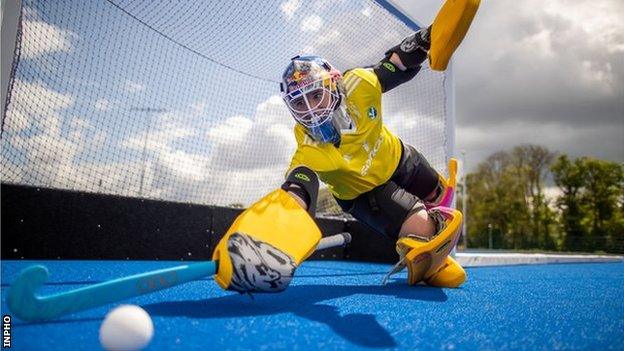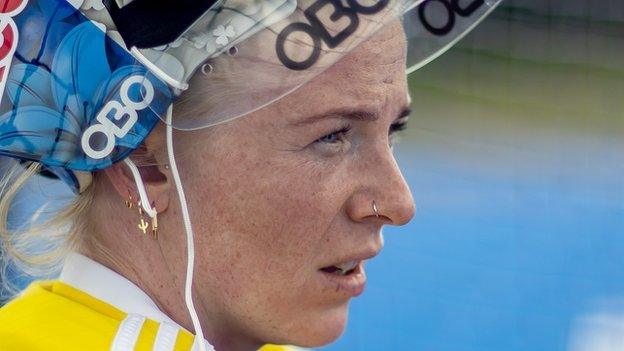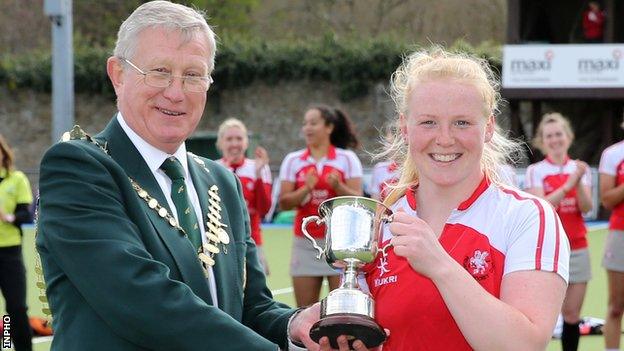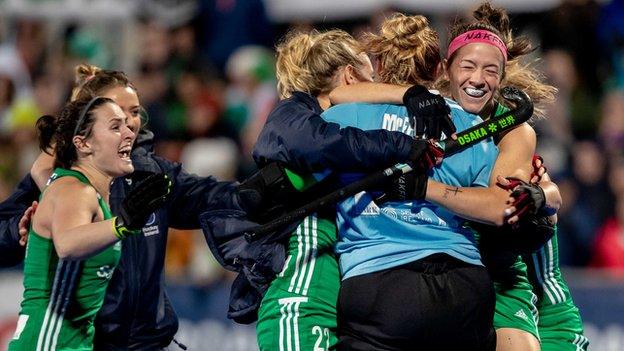Tokyo Olympics: 'I just wanted a normal life' - Ireland's McFerran recalls childhood in foster care
- Published

Ayeisha McFerran plays for club side Kampong in the Netherlands

Ayeisha McFerran has so often been a star performer for Ireland, with the 25-year-old goalkeeper making crucial saves to help the side reach the World Cup final in 2019 and a first Olympics Games.
The Larne woman, who made her senior debut a day after turning 18, is set to add to her 105 appearances when Ireland face South Africa in their Tokyo opener on 24 July. It is a story of success but also one of childhood trauma, with McFerran placed in foster care after her mother passed away.
For the first time she speaks publicly about her experiences in foster care - both positive and negative - in a bid to show other children in a similar position that they can fulfil their dreams just like anyone else.

"I would have been 14 so still quite young, trying to understand everything. I remember it as clear as day.
My mum was already bedridden at this point. Two of my aunts were helping to look after her and I remember hearing my brothers and sister crying upstairs. I eventually went upstairs to see what was going on. It was coming to the end of mum's life, but I had no idea that it was going to result in me and my siblings being split up.

Ayeisha McFerran looks back on her time in foster as a teenager
We were all really young, still trying to navigate life as it was, let alone losing your mum. It was really difficult to process anything at that point. My brothers went into care, I went and lived with my aunt and uncle for nine months and my sister was left to herself because she was almost 18. So we had to figure out our own paths without each other.
Initially, one of the social workers came in, sat down and met me. She said they were going to look for a placement and it could be anywhere in the country depending on availability. That was the start of the process and there was a family in my hometown of Larne, which I was really lucky with because I could have got placed anywhere in Northern Ireland.
So I went out, met the family and had dinner with them. This was over a period of a couple of weeks, it was quite a quick process in the end. I met with them and next thing I know I'm packing up all my clothes into binbags and off I go, and that's me kind of moving in to live with them for three years. I'm quite outgoing but shy when I go into new places and it takes time to build up that relationship.
They were very understanding of my situation, what I had come from and they were just very relaxed about me coming into their home. They just really made me feel very welcome from the get-go and that's something that many foster kids, I believe, don't have.
Over the space of the three years my hockey very much kicked off, I was very fortunate that I had that to turn to and had that as my way to getting out and being free and trying to find out who I was as a person. I was travelling up and down to Dublin, up to Randalstown - I got lifts from my school teacher Emma Knox and Ruth Maguire. I would have been lost without them, because if I didn't have that support network around me, as well as the foster family, I wouldn't be here.
My hockey was everything I had. That was my time to be free, to go and find out what I wanted to do, meet people and just essentially feel that I had that normal life. To get out of the house instead of sitting there all day - when it was time to go home it was like "I don't want to go home yet, let's see if someone else wants to hang around a bit more, to maybe knock the ball about or whatever". Just to essentially delay me going home because I didn't want to have to go home and face the reality - what's normal for me at the time maybe isn't as normal for many other kids and I think that was the hardest part. Looking back on it now I'm very grateful for what I had because my foster parents really did try everything they had to support me.

Ayeisha McFerran picks up a top goalkeeper award after helping Pegasus to the IHL title in 2015
I wouldn't necessarily say I was miserable but there are times when you're just like "I want a normal life", which I think is normal for any person of that age who went through what I went through to experience. Whenever I'm back at home for a few days or a bit longer, I pop in and see them or just send a message to let them know I'm thinking about them. They've been a huge part in getting me here and I would be selfish not to acknowledge that they did play a big part in that.
I think that the fact they didn't hold me back, it's huge in where I am. You do hear stories of kids not allowed to do things but they allowed me to do it, albeit sometimes I had to figure it out by myself. I had to get myself to Jordanstown to go to the gym. If that meant getting up at 5.30 in the morning for the train that's what it meant, but they always supported me, they never said I couldn't do anything. I think that's really, really important, it gave me the freedom to explore and be who I am and who I essentially wanted to be.
I always used to think that my childhood was normal. Yes, it was normal for me but it wasn't a normal childhood that most people would have. I think it's really important that there's other kids going through the same and not very many people hear the good stories about kids in foster care - you always hear the bad stories.
I think I can be an example of someone that those kids could look up to, that there is something bigger out there. It's not just surviving your A Levels, getting to 18 and being left to the world - at 18 you're still a child. I believe if I share my story to help one person them I'm proud of that.
It's something that I fully believe in and I've built my own network around me. It takes work, it's hard and it's not as easy as people think I make it out to be. I've had to work hard to get where I am - not with the support of parents driving me here, there and everywhere, handing me money out of their back pocket.
I've worked for everything I've had and if I can inspire one kid to do that and get out and see something bigger or make that decision to maybe go to university or go after that job they want, especially kids in care, then I really want to do it. I want to be open - if kids ever feel that they want someone to talk to then I'm here.

Ayeisha McFerran is Ireland's hero after her saves in the penalty shootout win Canada secures a place in the Olympics
They can just ask me those questions which they don't want to ask their foster families or social workers because it is awkward - they haven't been through it, they don't understand. For me I want to encourage those kids to go and be that bigger thing that they want to be. It's okay not to know where you want to go or what to enjoy. It takes time. I'm still figuring it out now, what I want to do and what I enjoy and I'm still asking these questions.
Keep trying to look forward and look to that bigger picture. Chase your dreams, they'll always lead you somewhere. It might not be where you want but a dream is always something of hope and if you've hope you're going to go anywhere."
Ayeisha McFerran was talking to BBC Sport NI's Nigel Ringland